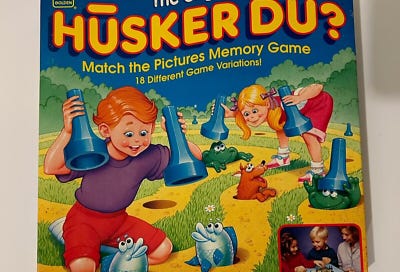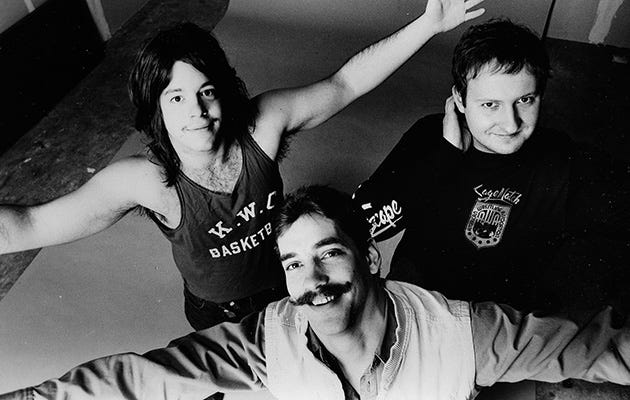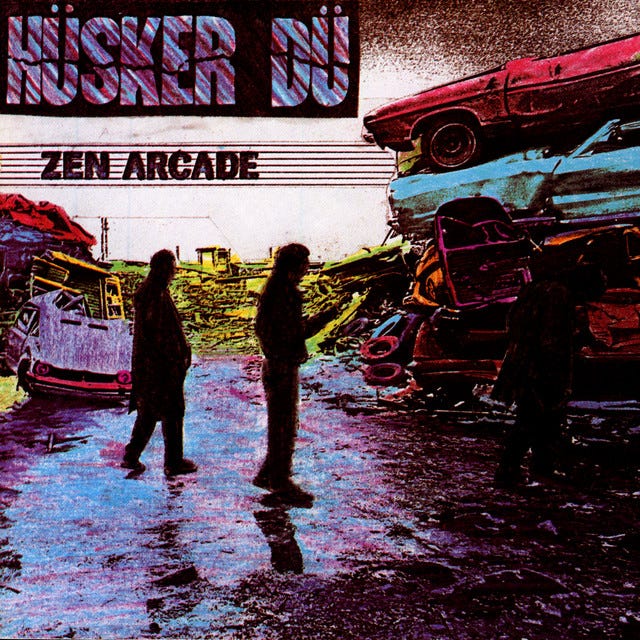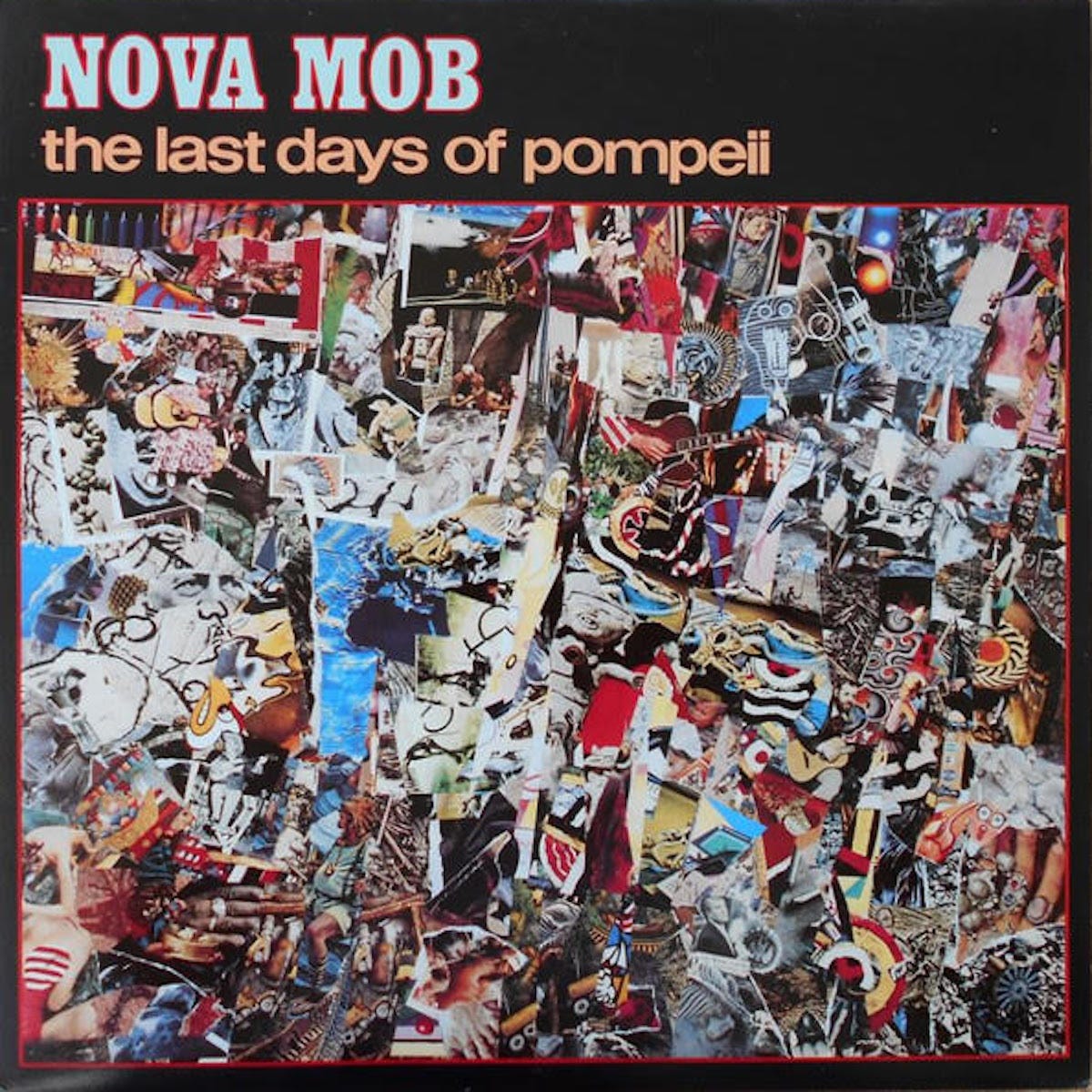Do You Remember These Important Years?
The class I took in college that had the most influence on me was easily Rock Music in the 70s and 80s. Despite the title, the course covered music beyond that range. The stuff from the 60s that served as building blocks for what was to come in the next twenty years and the music of the 90s: the synthesis of decades of new trends and genres
The course was divided into sections related to specific genres or musical movements. Students were charged with listening to several songs for each section, learning them, and identifying them on multiple-choice exams that were given several times a semester.
It's a pretty easy class for any serious music buff, but perhaps more challenging for students who took it because they figured it would be an easy A. It definitely was so long as you put in the time and effort to listen to the songs and attend the lectures.
One of those sections concerned alternative music of the 1980s, and one of the songs chosen was “Pink Turns to Blue” by Hüsker Dü. A band whose name I knew from a scene in Joe Dirt, as well as the Norwegian board game that gave them their name. Husker Du means “Do you remember?” in Norwegian.
The group added umlauts to the words. And those umlauts made me expect a sound closer to heavy metal, “Pink Turns to Blue” didn’t sound like anything I imagined. That same semester, I got into The Replacements, a fellow Twin Cities band. Each group wanted to best the other and developed an amicable rivalry.
”It was a friendly competition. We wanted to see them fail. We wanted them to be the second best band in the city,” said Replacements lead singer Paul Westerberg in a Magnet Magazine article about the local scene in Minneapolis.
They played at the same shows and beat a similar career path: they both signed to major labels that were a part of Warner Bros. Records. A track on The Replacements’ debut album Sorry Ma, Forgot to Take Out the Trash called “Something to Dü” was a playful nod to the relationship between the bands.
“Pink Turns to Blue” came from Zen Arcade, an album I was familiar with because of my time reading the Wikiepedia article on Green Day’s 2004 album American Idiot. I was interested, because I saw parallels between it and The Who’s rock operas. Two songs on American Idiot were lengthy, multi-part songs. “Homecoming” reminded me the “We Have A Remedy” section of “A Quick One, While He’s Away.” Tommy and Quadrophenia were also mentioned, as well as Zen Arcade.
An excerpt from a review by David Fricke caught my attention “Zen Arcade is probably the closest hardcore will ever get to an opera. A kind of thrash Quadrophenia…”
Quadropehnia was my favorite Who album at the time, so that was enough to intrigue me, Fricke’s recommendations were usually of interest to me. I got into Robyn Hitchcock because of Fricke’s Picks in the review section of Rolling Stone. I think I had misremembered that blurb being about Nick Cave. Both dark-haired troubadours and contemporaries, but very different approaches to making music.
I read the synopsis of the plot for Zen Arcade but didn’t listen to it. In those days, it was a little more difficult to find and listen to music on the computer. I don’t think it was on YouTube, and I didn’t bother searching for it. I also wasn’t about to download the album illegally and risk getting my mother the attorney into hot water. That was my reasoning at the time. Listening to the album came later and I was better prepared for it. I didn’t listen to punk music until I was a senior and got into The Ramones and The Clash.
Part of my college education involved expanding my taste in music and my collection. Zen Arcade was the first Hüsker Dü album I got.
I heard and liked enough to do a deeper dive; I got the albums that followed as well as the releases that preceded it, including a few EPs with some great covers like “Eight Miles High” and “Love Is All Around.”
They quickly became a part of my holy trinity of 80s alternative bands alongside The Replacements and R.E.M. Reading Our Band Could Be Your Life cemented them as a favorite. They were in regular rotation on my radio show and on mixes I made for people.
I even explored Bob Mould's and Grant Hart's solo careers and the bands they played in after Hüsker Dü split. I have a vivid memory of buying Sugar’s Copper Blue at Luna Music in Broad Ripple just before the spring semester was about to start in Bloomington. It was January and snowy, and I can picture the blue-green of the case that denoted it as a Rykodisc release.
Some of the solo stuff was out of print, so I had to find it online. That was something I did a fair amount in those days. If an album were not easily accessible, whether it was not available on iTunes or Amazon or as a physical release, I’d just search for the album and Blogspot and try to find a decent rip. I didn’t mind buying used, but sometimes the prices were outrageous and I justified finding other means because it’s not like that money was going to the artists anyway. It felt different than downloading through a filesharing service.
Hüsker Dü and The Replacements were two bands that were a key part of my bonding with several college friends. We could talk all day about their output, how excited the music made us, how it rewired our brains, and how it gave us a standard to measure other music by.
Those friends came from the student radio station, the place where I really found myself at IU. My first year of undergrad was quite lonely. It took some time getting used to living away from home, and I probably went back home too often for my own good. I struggled to make the close friendships I’d enjoyed in high school. Though I’m still friends with many of the people who lived on my dorm floor that first year. Great guys, but our interests didn’t overlap beyond sports.
But the radio station was different. My first year, I was only involved for one semester as a member of the music committee. That proved influential as it introduced me to Cisco Houson and Memphis Slim , I got to review Folkways compilations of their music. I also got to listen to Levon Helm’s Dirt Farmer. That was also the semester I first heard Music from Big Pink.
I didn’t get a radio show that first semester, which was totally fair given my lack of experience and relatively myopic taste in music. I primarily listened to classic rock then; The White Stripes was as current as my taste in music got then.
I didn’t return until the second half of my sophomore year and that’s when I found my core group of college friends. We’d all mostly grown up around the same part of Indianapolis; some came from out of state, but our interests, worldview, and sensibilities generally overlapped.
We were a tight, loving group and spent much time together at parties, at the station, and live shows. Their friendship was one you didn’t take for granted because it reminded you of how rare lasting and meaningful connections can be. It was a friendship where closeness was not defined by the amount of time you’d known each other but by what you shared during that time.
When you encounter someone you instantly click with, it can feel almost supernatural or perhaps an act of fate. To me, it feels like Homer and Gerald Ford became instant friends at the end of “Two Bad Neighbors.” Even though their acquaintance is new, it can feel like you’ve known them your whole life. Ringo joining The Beatles was like that because of how seamlessly the four of them gelled.
Sometimes, a friendship can take years to blossom. Timing is everything in a relationship, romantic or otherwise. And you might not be in the right place at the time. I’ve become closer to some high school classmates after graduation because of sports, whether fantasy football or the NBA.
There’s something beautiful about it because of how far back those memories and roots go. And I treasure that. It’s lovely seeing people you rode the bus to school with or studied Latin with become parents, build a career, and otherwise grow up. Looking at them, you can see who they were and who they have become.
I felt like I could really be myself around them, here was a group of people who could understand my oblique references or were game to try. They made me feel normal because there were people whose brains worked like mine or who were very happy to spend time with eccentrics like that.
The best memories I have from college that don’t involve my beloved roommate of three years, floor mates, or classes were with my radio station friends.
And though the years have seen us scatter and go our separate ways, when we get together, we pick up right where we left off.
It was through the radio station that I heard The Living End, a live album and the final release of Hüsker Dü before they dissolved into two solo music careers and a successful culinary career. I always admired Greg Norton for doing that after the group broke up. It’s like when Bill Berry left R.E.M. to become a farmer.
During my first year of grad school, Bob Mould appeared at The Bell House to read excerpts from his recently released his autobiography, See A Little Light: The Trail of Rage and Melody. I think he even played a song or two on an acoustic.
When he got to a section describing bear culture and their manner of dress, I started laughing because he was describing exactly how I looked. And he took notice. He said, “Check out the guy in the beard and flannel; you’re just loving this, aren’t you?”
When I got my book signed afterward, he asked me what was so funny and I explained that I found humor in matching the description of a typical bear. I also took some pride in thinking, “Bob Mould might think I’m foxy!” And while not interested in men, it’s flattering to think that the guy who wrote “If I Can’t Change Your Mind” and so many other great songs maybe thought I was hot.
Reading his autobiography and the chapter on Hüsker Dü in Our Band Could Be Your Life made me feel that our musical interests were aligned. Many of his early musical touchstones were some of mine.
“My father somehow realized music was important to me and would buy the old singles from the vendor for a penny each. "Happy Jack" by the Who, "Strawberry Fields Forever" by the Beatles, "Good Vibrations" by the Beach Boys, "There's a Kind of Hush" by Herman's Hermits. In 1967, those were my toys. They were also my refuge, a way of blocking everything else out. And I studied those singles more closely than anything I was taught in school.” - Bob Mould, See A Little Light: The Trail of Rage and Melody
That love was apparent in poppier songs Hüsker Dü recorded toward the end of their SST days. And while I love the early stuff, just like with The Replacements, I liked the stuff that was more melodic and poppier, closer to the AM gold and oldies I’d loved growing up than their hardcore roots.
I liked the way the band harnessed noise and melody; it was such a powerful contrast; I loved The Jesus & Mary Chain for similar reasons. Noise pop was like the sweetest candy coated with acid. The sonic equivalent of the warheads I love eating at cub scout camp.
A year later, I got to see Bob Mould play all of Copper Blue as well as select Hüsker Dü tracks at a free concert in Williamsburg. It was a very Brooklyn moment and one of my best memories from grad school along with the night I skipped my bibliography class to see Bob Mould the year before.
Another aspect of Bob Mould I love is his appreciation for Richard Thompson, that came when he was recording his first solo album after Hüsker Dü broke up.
This is what he said about that influence in a 2014 Guardian piece.
“1988 was a pretty crazy year for me. It marked the end of Hüsker Dü, and all the sadness, relief and confusion that came with it. I had just purchased a farm up in northern Minnesota and was pretty much left to my own devices for that entire year. Somebody at Folkways [a record label associated with the Smithsonian Institute] sent me a box of records and I was listening to a lot of Appalachian folk songs – coal-miner music from the Depression era, with mandolins and dulcimers, telling very simple tales of loss. It was so different to anything I was used to.
That tonal palette got into my head and I started messing around with a lot of alternate tunings on the guitar. I wanted to come up with a new language for my music. But then a friend of mine came up from Minneapolis and listened to the songs I'd been working on for eight months, and said: have you ever heard this guy Richard Thompson? I was like, no, who's that? So I listened to Shoot Out the Lights [with Linda Thompson] and some stuff by Fairport Convention, and I was shocked and kind of embarrassed by how much it anticipated what I'd been writing.
Since then, I've met Richard and spent a little bit of time with him. He's a wonderful gentleman and a pretty awe-inspiring guitarist, but we mostly talked about Scrabble. We have an outstanding date to play Scrabble at some point in the future.”
Mould contributed a great version of “Turning of the Tide” to a Richard Thompson tribute album, Beat the Retreat: Songs by Richard Thompson. And there’s a terrific live cover of “Shoot Out The Lights” that’s a bonus cut on the 25th anniversary edition of Mould’s solo debut, Workbook.
I haven’t explored Grant Hart’s solo career to the same extent as Mould’s but I always loved his contributions to the Hüsker Dü albums, he had a knack for writing propulsive melodies that were like his drumming: seemingly in danger of going off the rails, but never actually doing so. “Pink Turns To Blue, the first Hüsker Dü song I ever heard, was a Hart song.
His songs tended to be lighter than Mould’s though he did write a song about the murder of a waitress in West St. Paul. He was also responsible for designing the album artwork for the band and also did the cover for The Replacements’ Hootenanny.
He passed away on September 13, 2017 due to complications from Hepatitis-C and liver cancer, two months before the release of Savage Young Dü, a Numero Group compilation of the band’s early output, whether live tracks, demos, or studio recordings.
Some fans of the band are less than enthralled by the sound of Spot’s production on those early albums, and the group has yet to receive the remasters enjoyed by some of their contemporaries.
I don’t mind the original mixes, but what I heard on that Numero Group set has me hankering for a proper restoration of their music, especially after hearing the new mixes of Tim and Don’t Tell A Soul. With the right approach, new life could be breathed into that enduring music.
Whatever comes next, they will always hold a special place in my heart as a band that has brought me innumerable friendships. And much like appreciation for the bands on The Flying Nun label, enjoyment of their music generally signals that I can talk music with someone. They’re like a secret handshake in that way. Their very name poses a simple question: do you remember? Yes, I do.









